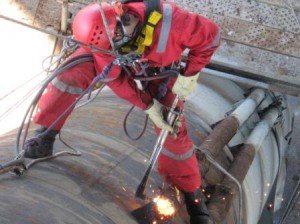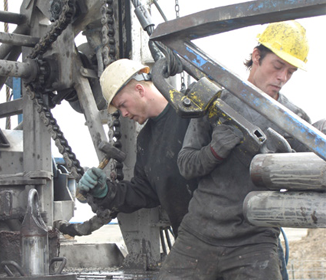While there are some oil rig jobs in less demand, qualified and skilled people to work oil rig welding jobs are always needed. Some regions of the country are not pumping out great volumes of oil while others are. For instance, the oil industry in the state of North Dakota is not only booming but exploding. Because this state has so much open land to drill and with a new horizontal drilling technology being used, oil coming from the Bakken formation has reached beyond four billion barrels.
The key in securing any of the oil rig welding jobs available is by having appropriate qualifications, which comes from education and training. One of the most common mistakes that people make specific to this type of job is the belief that training would be provided after being hired. In truth, oil rig companies are only interested in hiring people who already have all the required skills for the job. Even though some welding jobs are entry level, someone interested in oil rig welding jobs should complete necessary education and training prior to trying to secure a job.
On any level, companies looking to hire for oil rig welding jobs will test a person’s skill level before being hired. Therefore, to be offered a job such as this, an individual would need to come prepared. In fact, one of the best decisions a person could make to secure a welding job on an oil rig would be with certification. However, because rules for getting a certificate to work as an oil rig welder vary from state-to-state, it would be essential to determine requirements.
Another consideration specific to certification for oil rig welding jobs in the United States is that usually, this achievement cannot be transferred between companies. That means the individual would hold a certificate while welding for one company but in six months when renewal was needed, recertification would be required if staying with the current company or new certification if going to work for a different oil rig. Now as far as testing, this is usually taken through an accredited school or college so it would apply for work at any rigging company.
recertification would be required if staying with the current company or new certification if going to work for a different oil rig. Now as far as testing, this is usually taken through an accredited school or college so it would apply for work at any rigging company.
Obviously, having prior experience in the oil industry and especially having worked as a welder would certainly make an impression. While a well created resume would be necessary with or without experience, for the person looking at different types of oil rig welding jobs who had worked in the industry before and in the same position, the resume would speak volumes. Some of the specific things that would need to be highlighted include name of the previous employer, length of employment, position held, any processes responsible for, and materials used, and so on.
In addition to providing a potential employer with information about previous oil rig welding jobs, it would be beneficial to determine the types of jobs available and pertinent information about those jobs. That way, the person could be better prepared for the interview but also required testing.
Job Options
In regard to oil rig welding jobs, two primary options exist. For the first option, the welder would work on the oil rig full-time, being responsible for making needed repairs and creating things using new metalwork. For the second option, the main responsibility would be working on larger projects that need to stop drilling quickly. In both cases, welding of different types is performed as a means of keeping the rig and equipment in tip-top condition.
Although oil rig welding jobs can be worked by anyone, typically work of this type is physical demanding but also potentially dangerous. Because of this, oil rig welding jobs are usually secured by young men. Another consideration for work of this kind is that most workers spend time away from family so for married men or those in serious relationships, there should be on understanding on everyone’s part about the demands that go along with working as a welder on an oil rig.
Earning Potential
Welding is considered a blue collar job but even so, pay is actually good. For instance, entry level oil rig welding jobs typically pay around $42,000. However, if this person were to gain as much knowledge possible about welding techniques but also the oil industry and safety, and show dedication to the job, opportunities to grow and advance would be very real. Of course, the higher the ladder a person climbs the greater the potential for earning a higher salary.
Here are some articles about the job profiles in the oil industry:

